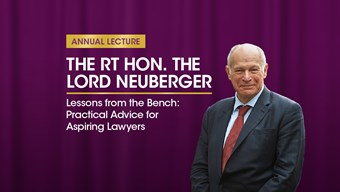Alumnus Henry Warner is a Senior Legal Engineer at Juro, an AI-enabled contract automation solution providing frictionless contract collaboration for legal and business teams. We spoke to Henry to get his insights on the future of legal tech and his experiences so far working in the industry.
By April Baniqued. Published 3 January 2025.
I've always been interested in solving social problems - for example, how do two parties come to an agreement when there's no trust? Through my undergraduate and postgraduate studies, and learning more about the legal and tech spaces, I recognised that a job in Legal Tech would allow me to work on resolving these challenges.
My core responsibility is looking after new organisations that are adopting the Juro platform. On a typical day, I speak with stakeholders - most of the time this is over video call but I also like to visit in person, including travelling to Oslo, Norway. I also spend my time converting contract templates into digital workflows. As well as work with my colleagues on other projects, including our product team when they're researching, designing and launching new features.
My time at the University prepared me for the working world through the style of teaching; the seminar-type classes had an environment where you're working with your peers and someone experienced. This is more similar to the working world than listening to lectures. I also wrote my dissertation on smart contracts and contract automation. During the research, I came across Juro. Without that module, I might have gone down a completely different path.
The part of my role that I enjoy the most is the continuous learning. Legal engineering requires me to constantly be learning, whether that be new areas of the law, industries and more. The learning is practical and tacit. It's not just about memorising new information, it's about doing something new. It's rewarding to look back and know that I can now do things that I couldn't before. From straightforward tasks to now complex projects with companies that are household names.
The biggest achievement is seeing our customer base acknowledge our consistency. Our team is one of the most highly rated in the whole contract lifecycle management sector. It's rewarding to see all our hard work pay off.
Most customers I work with are generous with their time and curious to learn how we can help them. Very rarely there are more challenging relationships that can be tricky to navigate, but these relationships are when I learn the most about people and the technology.
It was luck that led me to study at The University of Law. I'd missed the common October intake, so the January date was appealing as it meant I didn't have to wait another 6 months to start. Also, COVID-19 hit and the University seemed well-equipped to handle the mandatory remote studying during the lockdown. There was also the deep research part for the dissertation I was interested in.
Looking at future career plans, there are many opportunities for growth for me at Juro, as well as in the legal tech space and in the tech world more generally. I'm interested in the journey new products and features take, from the idea stage to entering the market. AI, particularly the rise of agents, is an area I'm keeping a close eye on. In the short term, over the next few months, I'm helping to launch a series of powerful AI tools within the Juro platform. I also have big plans for Juro's student outreach program which I founded just over a year ago and now co-run.
My advice for students looking to enter the legal tech industry is, firstly, to be fussy about the culture and vision of the organisation you're joining. Narrow down your search to the working culture that aligns with how you work best and a vision that inspires you.
Second, don't be too fussy about the role you're applying to. There are not that many entry-level positions in scaling tech and Legal Tech companies so you might not be able to start exactly where you want to end up. Focus on the skills you can develop in the roles available at your level of experience. I started as a Business Development Representative in Sales before transitioning into Legal Engineering.
Finally, once you've found a few organisations that meet your culture and vision threshold, don't wait for a job to be listed to reach out. Use LinkedIn to connect with members of the team and ask them questions about their roles. Developing a relationship with people already in the space is one of the best things you can do.
If you’re interested in learning more about the growth and application of tech in the legal industry, take a look at our MSc Legal Technology course.



